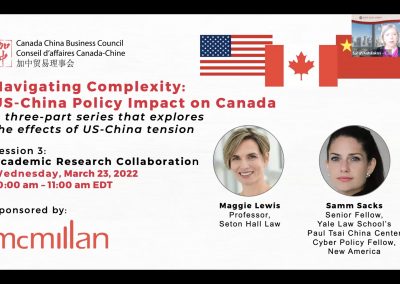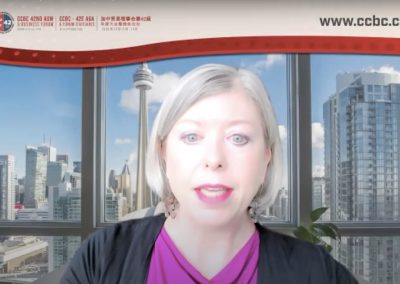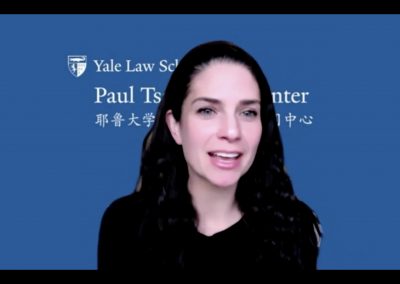Navigating Complexity: US-China Policy Impact on Canada – Session 3: Academic Research Collaboration
Navigating Complexity: US-China Policy Impact on Canada – Session 3: Academic Research Collaboration
On March 23, 2022 at 10 am EDT, the Canada China Business Council (CCBC) hosted Session #3 in the Navigating Complexity: US-China Policy Impact on Canada three-part webinar series. This session featured Maggie Lewis, a law professor at Seton Hall University School of Law, and Samm Sacks, Senior Fellow at Yale Law School Paul Tsai China Center & Cyber Policy Fellow, New America.
The session focused primarily on academic research collaboration between China and the United States, with additional attention directed towards the “China Initiative,” a prominent (and recently terminated) Department of Justice (DOJ) strategy aimed at eliminating economic espionage and promoting research integrity in American businesses and universities. This flashpoint issue is consistent with the “securitization” of the US-China bilateral relationship in recent years, resulting from broader political and economic tensions.
The link to the video presentation is available upon request. Please contact your regional Chapter Director to request access:
• Atlantic: Edward Dai
• Quebec: Philippe Jeanneau
• Ontario: Jeff Zhang
• Prairies: Philippe Jeanneau
• BC: Philippe Jeanneau
• Beijing: Noah Fraser
• Shanghai: Edward Dai
The real challenge for the United States – and other nations – is to promote domestic research in a way that prevents “threat by association” with regards to China, while also addressing the plethora (and varied) threats to research security from adversarial forces. The DOJ was often criticized for applying “sledgehammer” tactics in the realm of security consciousness when, instead, scalpel-like precision was needed to balance the promotion of research with the consistent application of rules and regulations. Issues with bias, failed prosecutions, and shifting departmental narratives eventually led to the initiative’s demise.
With the problematic framing of the China Initiative now behind it, the DOJ – Professor Lewis explained – should look to craft an approach that promotes research security and ensures a pro-innovation environment. The key elements for the US-side in this endeavour are research confidence, collaboration between industry stakeholders, and sufficient federal funding to attract (and retain) top talent.
CCBC thanks CanExport Associations for partial funding support for this program. Registration was free of charge for members; $25+tax for non-members per session. Simultaneous French interpretation was available for each session.
Sponsored by:
About the speakers:

Maggie Lewis
Professor
Seton Hall Law
Maggie Lewis is a professor at Seton Hall Law. Professor Lewis’s research focuses on law in China and Taiwan with an emphasis on criminal justice and human rights. Professor Lewis has been a Fulbright Senior Scholar at National Taiwan University, a visiting professor at Academia Sinica, a Public Intellectuals Program Fellow with the National Committee on United States-China Relations, and a delegate to the US-Japan Foundation’s US-Japan Leadership Program. She is a Member of the Council on Foreign Relations. Before joining Seton Hall, Professor Lewis served as a Senior Research Fellow at NYU School of Law’s U.S.-Asia Law Institute where she worked on criminal justice reforms in China. Following graduation from law school, she worked as an associate at the law firm of Cleary, Gottlieb, Steen & Hamilton in New York City. She then served as a law clerk for the Honorable M. Margaret McKeown of the U.S. Court of Appeals for the Ninth Circuit in San Diego. After clerking, she returned to NYU School of Law and was awarded a Furman Fellowship.

Samm Sacks
Senior Fellow at Yale Law School Paul Tsai China Center & Cyber Policy Fellow, New America
Samm Sacks is a Senior Fellow at Yale Law School’s Paul Tsai China Center and a Cybersecurity Policy Fellow at New America. She also consults corporate clients on China’s technology policies. Her research examines China’s information and communications technology (ICT) policies, with a focus on China’s cybersecurity legal system, the U.S.-China technology relationship, and the geopolitics of data privacy and cross-border data flows. She has worked as an analyst of China’s technology policies for the last decade, both in the private sector and in the national security community. Previously she launched the industrial cybersecurity business for Siemens in Asia and led China tech coverage for the political risk firm Eurasia Group. Her writings have appeared in Foreign Affairs, The Atlantic, MIT Tech Review, Slate, and she has testified numerous times before Congress on the U.S.-China technology relationship. She reads and speaks Mandarin and was a Fulbright Scholar in China.





